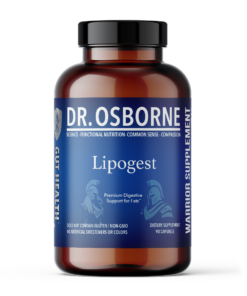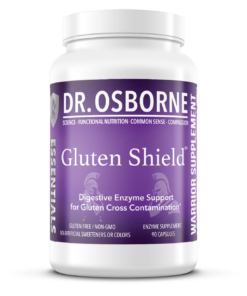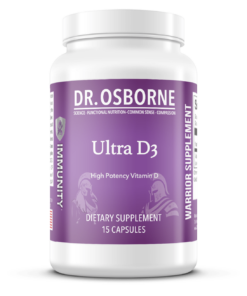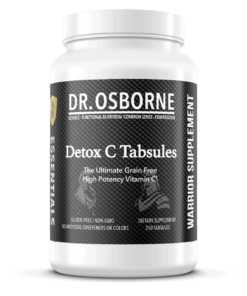new to the gluten free journey?
new to the gluten free journey?
$29.95 — or subscribe and save 10%
Suggested Dose:
Take one capsule before meals or as directed by a health care practitioner.
DOES NOT CONTAIN:
Wheat, gluten, yeast, soy, dairy products, fish, shellfish, peanuts, tree nuts, egg, ingredients derived from genetically modified organisms (GMOs), artificial colors, artificial sweeteners, or artificial preservatives.
Ultra Acid is designed to support the gastric phase of digestion directly and provide stimulus for the excretion of pancreatic digestive juices in the small intestine. Adequate hydrochloric acid is fundamental to healthy protein digestion, nutrient availability, and the maintenance of normal gastric flora.[1-3] There is a natural decline in the ability to produce hydrochloric acid, especially after the age of 60.[1] There appears to be an even greater decline in pepsin production related to normal aging.[4] Support of natural gastric secretions and acidity helps support normal digestion, absorption, and immune health.[5] Maintaining an acidic pH in the stomach helps support normal gastric and intestinal flora as well.*[6-8]
Provides Hydrochloric Acid to Help Maintain Gastric pH*
Contains Factors to Promote Healthy Digestion, Especially of Dietary Protein*
Supports Absorption of Certain Macro- and Micronutrients*
Helps Maintain Normal Gastric Flora*
Ultra Acid provides a variety of health-supportive factors. L-glutamic acid, betaine HCl, and pepsin, a proteolytic enzyme, which assist in protein digestion. Gentian root, an herbal bitter, promotes normal secretion of saliva and gastric acid for digestive support. HCl (hydrochloric acid) supports nutrient absorption and helps maintain a healthy gastric pH, which, in turn, supports healthy gastric ecology. *
This amino acid can be obtained from dietary protein or synthesized endogenously from other amino acids, such as glutamine. L- glutamic acid is used in Ultra Acid as an acidifying agent.*
Betaine (also known as trimethylglycine) is a natural substance found in foods such as beets and spinach. Research suggests that betaine supports cell health by acting as a methyl donor, and this, in turn, supports healthy methionine, homocysteine, and hepatic fat metabolism. Betaine also functions as an osmolyte, which supports the integrity of cells and proteins during fluctuations in hydration, salinity, and temperature. Betaine HCl, the acidic form of betaine, has traditionally been used to support digestion and absorption due to its ability to lower gastric pH.*[9,10]
One of the first enzymes to initiate protein digestion, pepsin is first synthesized in the parietal cells of the gastric mucosa and secreted as the inactive zymogen precursor pepsinogen. Hydrochloric acid activates pepsinogen to convert it to pepsin once it is outside the cell. This activation sets up a chain reaction leading to the production of still more pepsin. Porcine pepsin, in addition to betaine HCl, is provided in Ultra Acid with the goal of promoting more endogenous pepsin production. *[4,6]
Used for centuries to support healthy digestion, gentian contains the bitter glycosides gentiopicrin and amarogentin. Gentian’s bitter taste can be detected even at a dilution level of 50,000:1. Gentian root appears to support digestion by stimulating secretion of saliva in the mouth, hydrochloric acid in the stomach, and digestive juices from the pancreas. Due to the stimulant effect that gentian root has on endogenous production of HCl, individuals may be able to discontinue Ultra Acid after a period of use. *[11-14]
Ultra Acid is formulated with a variety of compounds and is designed to support gastric acidity, digestion, and normal gastrointestinal flora. Ultra Acid should be taken with, or immediately following a meal. Do not use if there is a prior history of, or a current complaint of, a peptic or duodenal ulcer. *
Digestive enzymes and Ultra Acid both can be extremely effective if your stomach acid reserve, your stomach cells are damaged and not producing enough acid or if your pancreas and intestinal cells are damaged and not producing enough digestive enzymes. One of the hallmark symptoms of low stomach acid is constipation, even though you’re eating plenty of vegetables and plenty of fiber. If you find you’re that type of person, then replacing your stomach acid might be a smart move to help overcome that.
This site uses Akismet to reduce spam. Learn how your comment data is processed.




Stay up-to-date with the latest articles, tips, recipes and more.

*These statements have not been evaluated by the Food and Drug Administration. This product is not intended to diagnose, treat, cure or prevent any disease.
If you are pregnant, nursing, taking medication, or have a medical condition, consult your physician before using this product.
The entire contents of this website are based upon the opinions of Peter Osborne, unless otherwise noted. Individual articles are based upon the opinions of the respective author, who retains copyright as marked. The information on this website is not intended to replace a one-on-one relationship with a qualified health care professional and is not intended as medical advice. It is intended as a sharing of knowledge and information from the research and experience of Peter Osborne and his community. Peter Osborne encourages you to make your own health care decisions based upon your research and in partnership with a qualified health care professional.
. –
Helps prevent my reflux, when I eat high protein
Meri H. –
I have chronic gastritis (shown in an upper GI) thought to be from all the migraine medication I take but now not so sure! Would this (Ultra Acid) be a good product for me to try? I have been taking a PPI for literally YEARS along with an additional RX strength Ranitidine as needed and still have stomach pain at times. No constipation, however…..
Alice H. –
This has a little less HCl than in another product I’ve used, but it seems to work well. I’ll know more in a few months.
Meri H. –
I have had chronic gastritis for 20 years. Since taking this product for about 40 days, was able to stop PPI and have no stomach pain!!!! I can even eat an orange without suffering!
Kimberely B. –
It seams to be working well. I have tried another brand, i only need one of this, I like this better.
. –
I started taking Ultra Acid because I came to believe I was not digesting proteins properly. My bowel movements weren’t regular, and I found my face was pale.
After taking Ultra Acid for about 4 -5 days, I noticed an improvement in the frequency of my bowel movements. I went from once per day to two to three times per day. I also noticed the colour in my cheeks coming back.
I bought another four bottles of the supplement since while completing a harmful organism cleanse to ensure there was a sufficient amount of acid in my stomach. I do believe my stomach acid has increased due to taking this supplement, as I initially took four or five pills (depending on protein content in meal) and last time I took three and I can feel the uncomfortable feeling that most likely indicates to much stomach acid. This is excellent, as I was not wanting to continue on a supplement forever. I’m quite impressed with the fact that this supplement is helping my body increase its own acid production!
Thank you Dr. Osbourne
Donna N. –
I’ve been taking this to help me digest protein better, since it doesn’t seem like I’ve been making enough stomach acid. I was worried that it would cause a problem feeling too much acid if I misjudged and took too much, but that hasn’t been the case at all. It works great!
. –
I bought Ultra Acid along with Yeast Shield for my daughter. She has a systemic yeast infection, affecting her digestive tract. It was misdiagnosed previously by a doctor, who did not link the yeast infection to the digestive problems that my daughter was having. As a result, the problem only succeeded in getting worse over a long period of time. She had chronic constipation and was getting weaker. After listening to Dr. Peter Osbourne’s talk on yeast infections which addressed her symptoms exactly, I ordered these two supplements. My daughter’s condition is improving; with the Ultra Acid assisting her digestion of food, she has been making regular bowel movements. The Yeast Shield is slowly but clearly getting rid of the yeast infection. I am highly pleased with the results.
Monique T. –
I was tested and found to have low stomach acid. It can be difficult to find a digestive support that has the enzymes needed and that is free of any grains. I am on my second bottle and it seems to be working great for me! The only thing that could make it better is if it included some Lactase for those occasions I have a little dairy.
Leigh S. –
Ultra Acid helps to increase my low stomach acid level so that I can properly digest my meals. It also aids with my dry mouth issues, so it delivers dual benefits.
. –
I took one capsule before going to a potluck and had a little bit of dessert that I learned after biting into it, was dairy. I did not have any lactate tablets with me and did not have a problem. Yeah!
Maile E. –
I have suffered from heartburn for years and recently quit taking prilosec. Ultra Acid has helped me to not suffer from heartburn and has helped with proper digestion of my food. Thank you!!
Charmaine M. –
Not sure I needed this, I though I did because of digestive issues, but after taking I am not sure. I do love the fact that there are no irritants in it.
Linda H. –
It works!
Steve P. –
I had some problems digesting food, but when I started taking the ultra acid, my acid reflux has gone away and I am digesting food much better.
Dr glutenfreesocitey.org has the best supplements. Their products are amazing. I will only buy supplements from Dr. Osborne. He has the best quality supplements ever.
Joan P. –
I started using Ultra Acid about 3 weeks ago. I’ve noticed my digestion has improved in the sense that food moves through the GI tract faster and with more regularity as to time of day. JP
Nelda S. –
Excellent!!! It really helps my digestion. I don’t experience bloating. Even if I eat something I know I shouldn’t. Also, Im able to sleep if I eat later than I usually would when life happens. Thank you for your products.
Kayleigh K. –
Really helps relieve constipation! I added ultra acid a little after 1 month in of eating gluten & dairy free, low-histamine, & exploring my FODMAP triggers. Added ultra acid to my routine of ultra nutrients, biotic defense, omega, gluten shield, hist assist, & ultra sinus support.
Elba V. –
I love dr Osborne products, especially ultra acid it has helped me in bringing my ph level up to where I no longer struggle with indigestion pain
Quieta B. –
I have searched for a truly gluten free hcl supplement and was so happy to find this one
Beth B. –
Ultra Acid seems to work nicely
not too harsh
. –
I react real
Well to
This as it has real
Clean ingredients. Great job of making it.
Elba V. –
I love this product ultra acid for its efficiency to prevent getting acid reflux with my meals and if I do forget to take before my meal
I experience some reflux an hour or two later I just take it then and still helps with reducing the acid reflux even hours later.
Claudia G. –
This supplement is one of the best that I take to aid in my digestive issues.
Elaine B. –
This product really worked for my digestive issues. I also appreciate the fact that it is grain free.
Maria K. –
Ultra acid has helped my father and I with GERD.
Valerie W. –
Definitely notice a difference in improved digestion after eating eggs & especially red meat; before Ultra acid my belly would distend really bad and often freeze up for 24 hrs or more. I now hear “little gurgles” from my belly after eating & taking the Ultra acid. I still have a Long way to go with my health, but at least I’m no longer scheduled to have my colon removed. Dr Osborne’s supplements are the Best!
Diane G. –
Ultra Acid has definitely improved my digestion. But I see many people take it Before a meal with good results, but then bottle says to take After a meal. Which way is best?
Delores W. –
Essential product if you have malabsorption issues. This has greatly improved my digestive issues, especially when eating meat. I also take gluten shied with this product since it has digestive enzymes that help me break down protein, fats, and carbs. Great product!!!
Sandra R. –
I experienced some acid reflux after each meal. Taking Ultra Acid helps a whole lot from having the burning sensation in my throat.
Diane G. –
First of all, I am very happy that I found Gluten Free Society Supplements, some of which are the Digestive Enzymes and Ultra Acid. I am having some Pancreatic cysts issues and I occasionally get a little heartburn. I take 1 Ultra Acid AFTER my meals as the bottle states, but in your description of this supplement, on the supplemental page, indicates to take BEFORE. Please explain the proper protocol.
Elba V. –
Love dr Osborne products. I always recommend his products to friends and family. I love taking Ultra Acid for constipation and upper stomach pain relief after eating so I take 4 capsules with a meal and it really helps for both issues